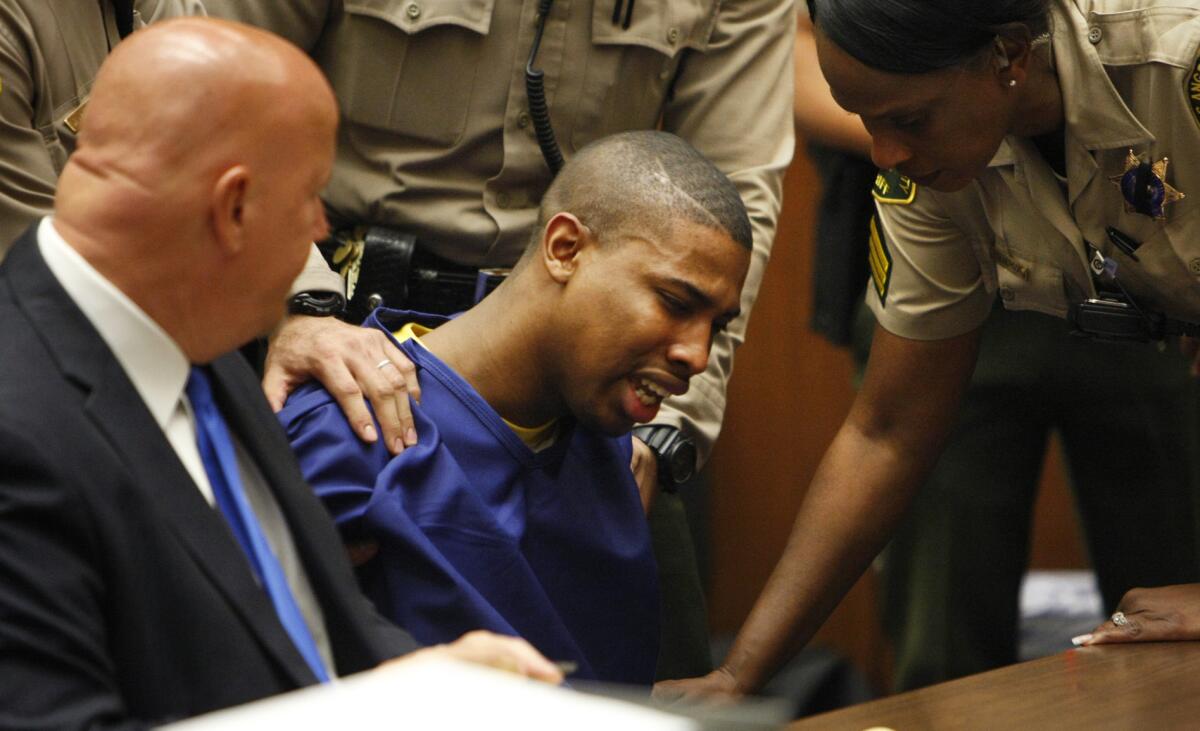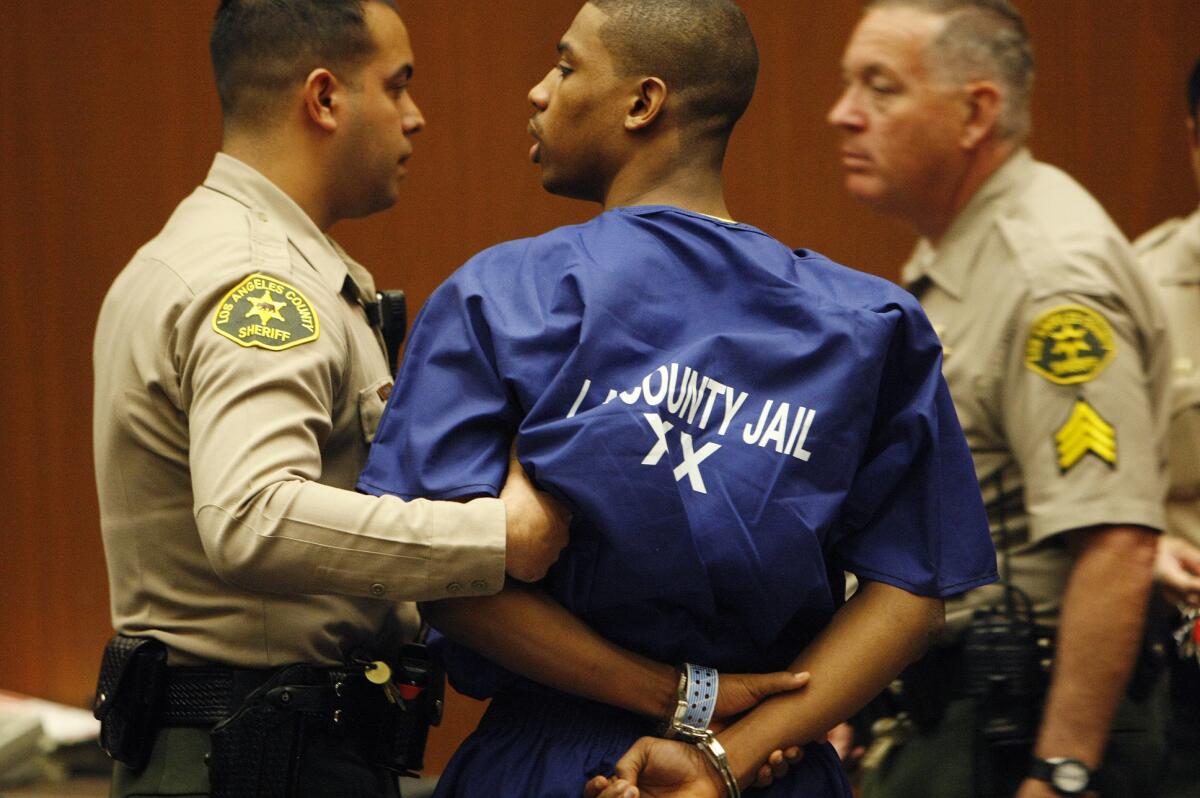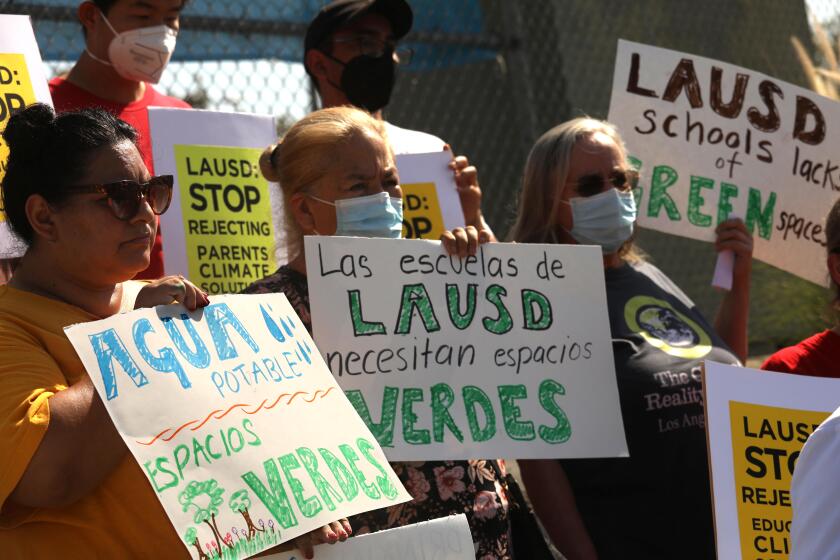Years ago, I applauded the 40-year sentence for a shooter at a party. Now I’m rethinking things

- Share via
The email that landed in my inbox was spare and direct:
“Years ago you wrote an article about Brandon Spencer. A young black man convicted for shooting into a crowd. I think you should listen to this podcast and consider writing another article about Brandon.”
I’ve spent decades writing about violent crime, but I knew immediately which article she meant.
In April 2014, I’d written a column castigating Spencer, who had just been sentenced to 40 years in prison for a mass shooting that wounded four people at a Halloween party on the USC campus in 2012.
The column was a harsh take on a tragic case. I was sick of writing about the innocent victims of senseless gun violence, like 7-year-old Evan Foster, who was caught in the crossfire of a gang feud at an Inglewood park and died in his mother’s arms.
I had no tears to waste on Spencer’s merciless sentence. “Pull a gun, go to jail,” I wrote. “This is real life, not a video game.”
Afterward many readers complained that I’d been cruel and unyielding in painting Spencer as little more than a “gun wielding troublemaker.”

Spencer, 19 at the time of the shooting, had legions of supporters who vouched for his character in court, including an LAPD officer. But police found the trappings of gang life — gunplay and gang signs, taunts and threats — in photos and posts on his phone.
The jury took only three hours to convict him. “Brandon Spencer ought to be considered an object lesson by wannabe gangsters carrying guns,” I wrote back then.
It never occurred to me that Spencer might be innocent. But that is what the podcast I was urged to listen to contends.
“Unjust & Unsolved,” created and hosted by radio producer and reporter Maggie Freleng, examines the cases of people who say they were wrongly convicted.
A recent episode featuring Spencer’s case argues that the evidence against him was thin, the prosecutors bloodthirsty, the defense attorney ineffective, and that USC was desperate to look tough in the wake of three high-profile murders of international students.
“Brandon should not be serving another day in prison,” Freleng said on the podcast last month. His legal advocate Patricia Cardenas insists he is an innocent kid “who was just thrown to the wolves.”
::
The podcast is insightful and intriguing — but it didn’t convince me that Spencer is innocent.
Still, it did make clear the injustice of a mandatory 40-year term for a young man who killed no one, had no significant criminal record, worked steadily and had plenty of upstanding people in his corner.
And it made me feel ashamed for the way I had mocked the tears Spencer shed in court after his sentence was announced. “A tantrum,” I’d called it in my column.
The podcast made me see the case in a different light.
I’d reduced Spencer — still in his teens — to a symbol of wanton thuggery instead of seeing a young man worth salvaging.
Looking back, I can clearly see that Spencer was a product of his circumstances and the tenor of the times — as certainly as I was a product of mine.
He grew up in Inglewood, when guns were plentiful and warring gangs battled openly. In 2011, he was shot in the stomach outside an Inglewood restaurant. Police contended the USC shooting — which wounded the young man suspected of shooting Spencer — was payback for that.
I am the mother of girls who grew up in the suburbs. They didn’t have to worry about what colors they wore. Still, they have had to dodge bullets more than once: at a house party, a Hollywood club and even while waiting at a bus stop in Chatsworth after a high school football game. I’d grown up ducking bullets as a teenager in Cleveland; I can still remember how scary that feels.
As a mother, I worried that my daughters were perpetually at risk because of impulsive gun-wielding young men, recklessly settling scores. My take on Spencer was shaped by that history.
But what if I had been the mother of boys, wrestling with the pull of the streets? I imagine I might have seen things in a more nuanced way and that 40 years in prison would have seemed undeservedly cruel.
::
In the eight years since that USC Halloween party shooting, our collective perspective on crime and punishment has shifted. Spencer’s case is a prism that illuminates that.
More than 30 years ago — as gang homicides hit record-breaking levels in Los Angeles — California launched a crackdown on guns, gangs and habitual criminals, with stiff mandatory sentences that yoked thousands of young men to decades-long prison terms.
By the time Spencer entered the criminal justice system in 2012, it was on the cusp of evolving again.
The week after he was arrested for the USC shooting, Californians voted to soften the state’s harsh “Three Strikes” rule. Two years later, voters endorsed reducing a host of nonviolent felonies to misdemeanors, taking prison off the table for petty criminals.
Neither of those reforms would have benefited Spencer, who has insisted all along that he is innocent of the shooting and did not belong to a gang.
Yet they heralded a dramatic change in our attitudes toward sentencing — a tilt away from retribution and toward rehabilitation.
Spencer’s 40-year term was the mandatory minimum the judge could decree in 2014, given the sentencing “enhancements” tacked on to cases involving gang members and guns.
The prosecution wanted Spencer sentenced to160 years — 40 years behind bars for each person wounded by his bullets, a reflection of the official mindset back then.
“You don’t punish the luck — that no one died. You punish the callous conduct,” then-Dist. Atty. Jackie Lacey said in 2014, when I asked her about Spencer’s sentence.
Now Dist. Atty. George Gascon — elected last year to replace Lacey — is trying to do away with sentencing enhancements that add prison time. And California just announced a plan to close its juvenile prison system, which has been failing youthful offenders for most of its 80 years.
We are collectively much less naïve about the flaws of the criminal justice system and the fallibility of police officers than we used to be.
Science has shown us how bias can tilt the scales of justice. Experience has taught us that prosecutors don’t always pursue truth. And body-worn camera evidence makes clear that some law enforcement officers lie and bend the rules.
But we haven’t made good use of that knowledge. We’re still swinging back and forth between crime-and-punishment extremes, playing politics instead of pursuing new solutions.
We’ve never fully invested in the kinds of prevention programs that offer alternatives to gang culture and get guns off the streets. A few heralded efforts have shown scattered success, but we’ve doubled down in the past on policing instead.
The problem of rising crime is real, and addressing it requires that we consider more than simply the menace of bad boys with guns. It demands that we take into account the needs of neighborhoods that suffer the most from its fallout — and that means more than warehousing folks in penitentiaries.
Spencer’s case illustrates how complicated the issue can be. Do you send a message or try to save a soul? Are we punishing Spencer for wounding gang members or for frightening college kids? Does it matter that no one went to jail when Spencer was shot the year before?
I don’t know how Spencer will fare going forward. He’s scheduled to be in court later this month for a hearing that will help determine whether he will be eligible for parole.
I do suspect he’s already learned whatever lesson a life term in prison can teach.
And I have been reminded of something too: how inadequate the criminal justice system is for dealing with what are, at their heart, social issues. And how blinding the process of deciding guilt and meting out punishment can be.
Instead of fighting for tougher sentences, and deluding ourselves that locking up the Brandons for life will change anything, we need to focus on empowering communities, strengthening families and offering paths that lead away from incarceration and toward restoration.
That, in the long run, is the only real route to safer streets.
More to Read
A cure for the common opinion
Get thought-provoking perspectives with our weekly newsletter.
You may occasionally receive promotional content from the Los Angeles Times.










